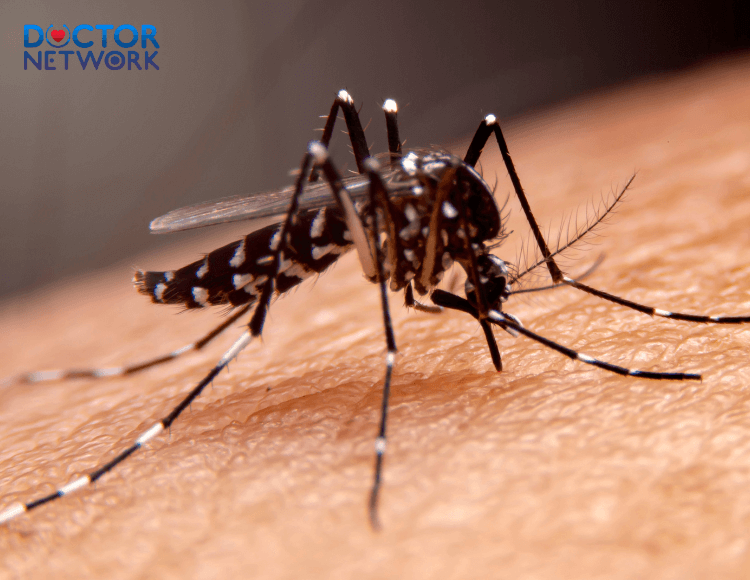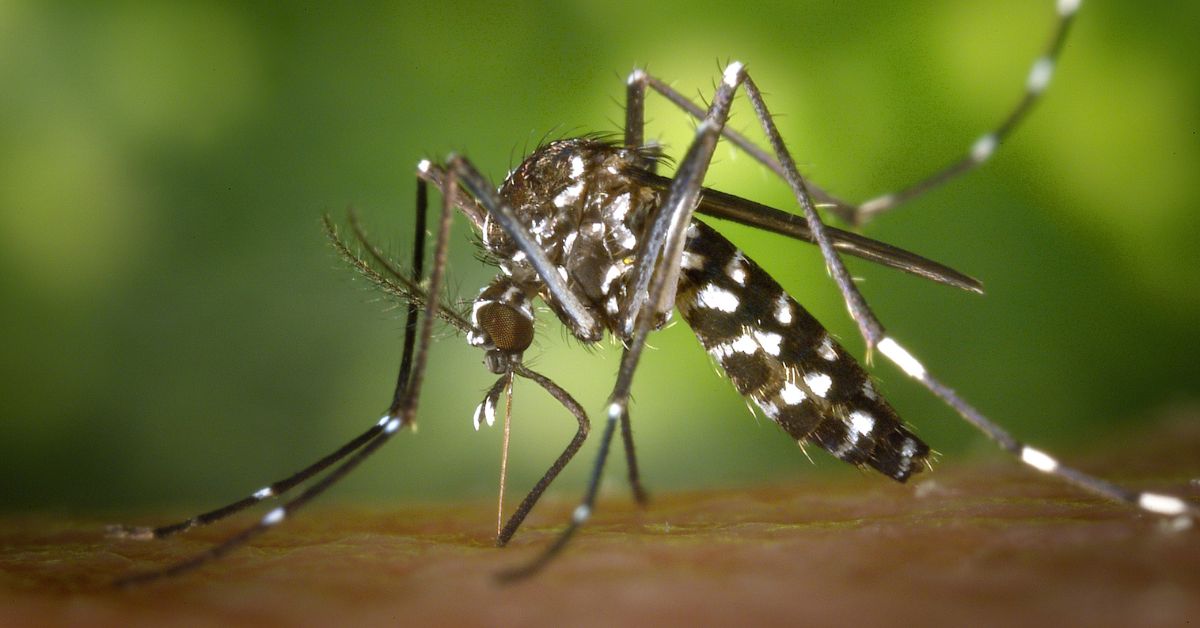Dengue fever is an infectious disease caused by the dengue virus, transmitted through the vector insects Aedes aegypti and Aedes albopictus mosquitoes. This illness typically presents with distinctive symptoms such as high fever, muscle and bone pain, headache, and can even cause bleeding from the nose and gums. This article explores Why Do People Recover from Dengue Fever Then Die.
Symptoms and Stages of the Disease
Dengue Fever Symptoms
- Rapid Onset of Fever
Dengue fever often starts with a rapid increase in body temperature, characterized by a burning sensation, headache, and discomfort. This rapid increase is usually one of the first signs of the disease and can last for a short period.

Dengue fever, why you get better and then die – Dengue fever often begins with a rapid increase in body temperature
- Muscle and Bone Pain
Muscle and bone pain are common symptoms of dengue fever. The sensation of aching, especially in the joints and muscles, increases discomfort and affects the patient’s mobility. This pain can decrease the quality of life and create discomfort.
- Bleeding from the Nose and Gums
One of the severe manifestations of dengue fever is the ability to cause bleeding from the nose and gums. This bleeding can be frequent and may appear suddenly. It is an important sign to note, and the bleeding can intensify as the disease progresses.
Severe Stages and Complications
Severity of the Disease and Common Complications
In the severe stages of dengue fever, patients may experience a significant decline in health. The severity of the disease is often assessed based on indicators such as the level of platelet decrease and the drop in blood pressure. Common complications may include dengue shock syndrome and internal bleeding.
Health Issues Leading to Death After the Disease Stage
Death after the disease stage often occurs due to severe health problems like respiratory failure, heart failure, and multiple organ syndrome. Specifically, internal bleeding and blood pressure imbalance can be dangerous issues, posing a risk of death.
Why People Recover from Dengue Fever Then Die
Treatment and Management of Dengue Fever
- Treatment Methods and Medications
In treating dengue fever, the primary methods usually focus on symptom relief, maintaining blood pressure stability, and reducing the risk of bleeding. Fever-reducing and pain-relieving medications may be used to improve patient comfort. Additionally, maintaining a balanced fluid and electrolyte level is important to prevent health deterioration.
- Supportive Measures for Condition Management
Treatment support through measures such as increasing fluid volume, closely monitoring blood pressure, and performing regular blood tests is important for disease condition management. Patients need to be closely monitored during this stage to detect any complications early and to provide timely intervention.

Support treatment with measures such as increasing water volume and closely monitoring blood pressure indicators
Factors Leading to Death
- Why People Recover from Dengue Fever Then Die – Delay in Hospital Arrival
One of the decisive factors for patient survival is the timing of their arrival at the hospital. Timely medical care can determine the recovery ability and reduce the risk of death. Patients receiving early medical attention have a better chance of effective treatment.
- Complicated and Uncontrollable Complications
Complicated complications of dengue fever, such as internal bleeding, dengue shock syndrome, and heart failure, can be fatal factors. The rapid development of these complications sometimes increases the risk of becoming uncontrollable, posing a significant challenge to the treatment and management process.
Prevention and Community Management
Dengue Fever Prevention Strategy
- Community Education on Dengue Virus and Prevention Measures
Enhancing community education on the dengue virus and its prevention is a crucial element in curbing the spread of the disease. Communities need to be fully informed about how the virus is transmitted and how they can protect themselves and their families from the vector mosquitoes. Moreover, initiating information campaigns and guidelines on cleanliness and eliminating mosquito breeding sites plays a significant role.
- Environmental and Habitat Management to Prevent Virus Spread
A significant part of the prevention strategy is environmental management to reduce the vector mosquito population. Handling mosquito habitats, such as standing water, waste, and forested areas, helps prevent the vector mosquitoes’ development and reduces the risk of dengue virus infection.

Treating mosquito habitats helps prevent the development of vector mosquitoes and reduces the risk of dengue virus infection
The Importance of Community Health Systems
- Capacity for Prompt Diagnosis and Treatment
Community health systems play a vital role in the early detection and treatment of dengue fever cases. Training and equipping community health workers with diagnostic and treatment methods enhance patient recovery capabilities. Regular testing campaigns and early diagnosis help prevent disease escalation and reduce the risk of death.
- Psychological Support and Health Education
In the process of community prevention and management, psychological support and health education are crucial. Communities should be encouraged to participate in health education activities, from discussions to campaigns that raise awareness about the importance of maintaining health and implementing preventative measures. Meanwhile, enhancing psychological support for patients and their families helps reduce stress and increase resilience during the treatment process.
Scientific Evidence Explaining “Why People Recover from Dengue Fever Then Die”
Here are some scientific findings explaining why people recover from dengue fever then die:
- According to a study by the University of Oxford (UK) published in The Lancet Medical Journal in 2020, the most common cause is due to dengue shock syndrome. The disease’s progression to severe stages leads to coagulation disorders and decreased blood circulation volume.
- A study by the Ho Chi Minh City University of Medicine and Pharmacy in 2021 noted the phenomenon of fluid overload causing electrolyte and acid-base imbalance, increased blood potassium, leading to arrhythmias, and heart stoppage as the cause of 17% of dengue fever deaths during recovery.
- According to medical literature, 12% of patients die from acute myocarditis, heart failure, and cardiogenic shock. These are dangerous complications of dengue fever due to hypersensitivity reactions.
- Some cases of sudden death are due to cerebral hemorrhage or ruptured brain blood vessels, accounting for 6%, according to statistics from the Asian Society for Infectious Diseases, 2017.
Why do people recover from dengue fever then die? Dengue fever is a serious condition that can lead to death if not promptly cared for and treated. Prevention of dengue fever plays a critical role in reducing the risk of illness and preventing the spread of the dengue virus. Proper disease management from the early to severe stages improves patient recovery chances. Support from the community, through education campaigns and environmental management, as well as psychological and medical support from the community health system, are all important in helping patients overcome the challenges of dengue fever.
References:
Why are people with dengue dying? A scoping review of dete…bmcinfectdis.biomedcentral·2
Kiểm Duyệt Nội Dung
More than 10 years of marketing communications experience in the medical and health field.
Successfully deployed marketing communication activities, content development and social networking channels for hospital partners, clinics, doctors and medical professionals across the country.
More than 6 years of experience in organizing and producing leading prestigious medical programs in Vietnam, in collaboration with Ho Chi Minh City Television (HTV). Typical programs include Nhật Ký Blouse Trắng, Bác Sĩ Nói Gì, Alo Bác Sĩ Nghe, Nhật Ký Hạnh Phúc, Vui Khỏe Cùng Con, Bác Sỹ Mẹ, v.v.
Comprehensive cooperation with hundreds of hospitals and clinics, thousands of doctors and medical experts to join hands in building a medical content and service platform on the Doctor Network application.


























